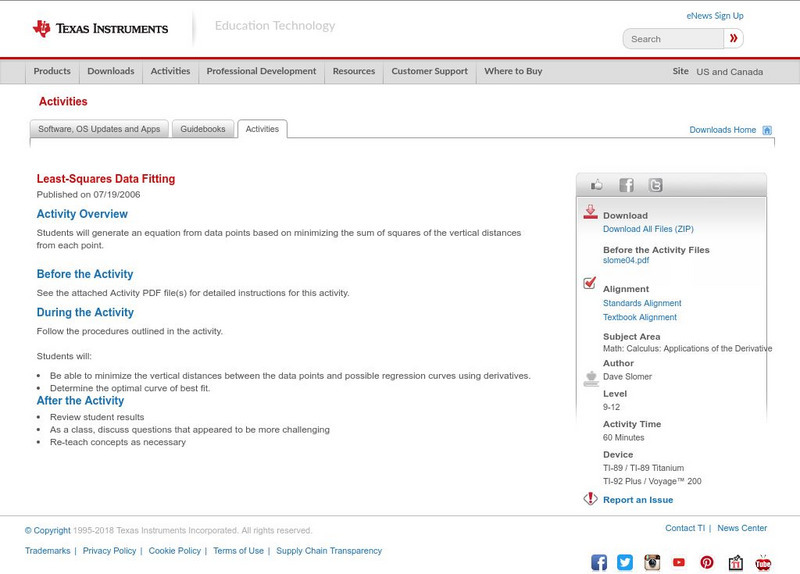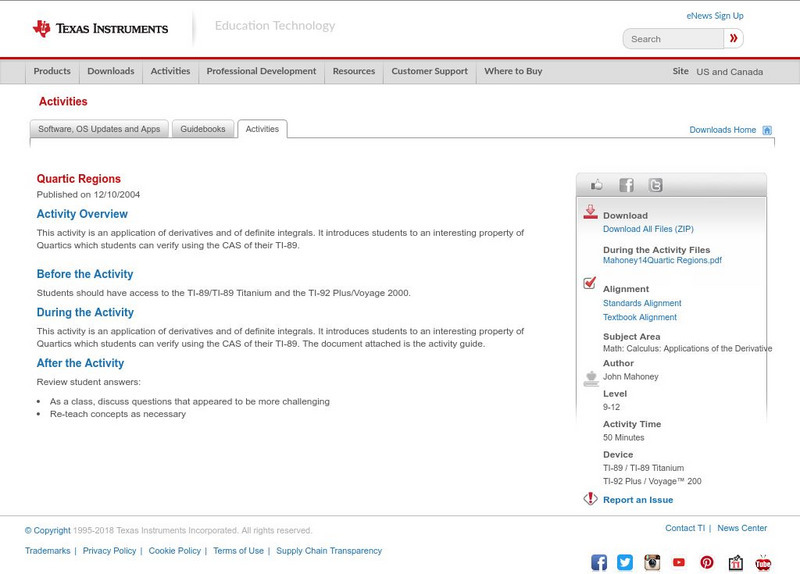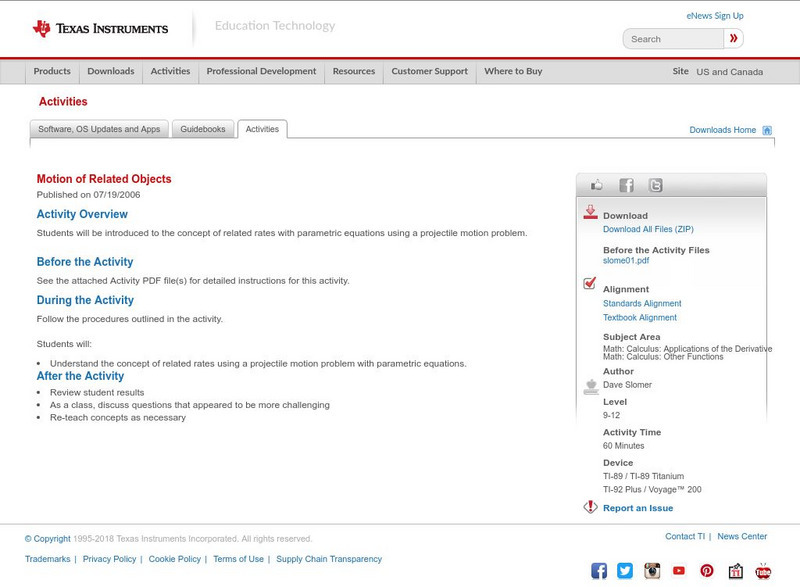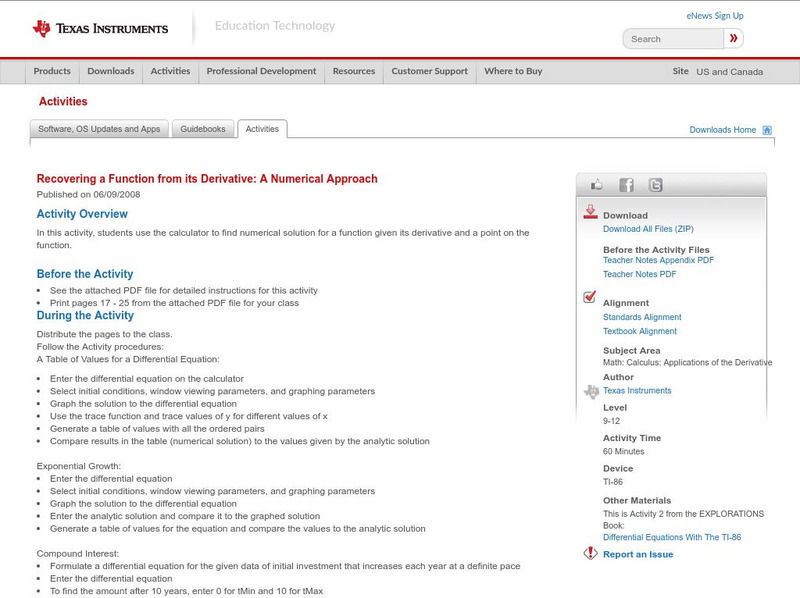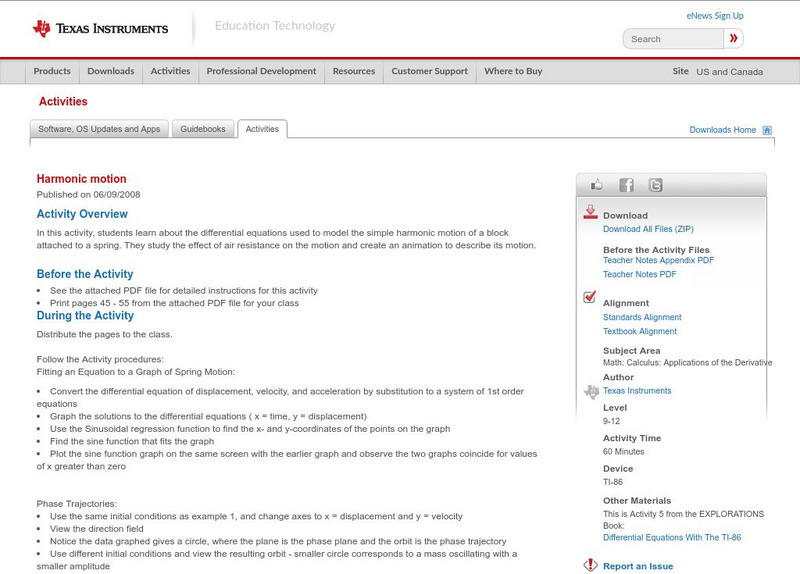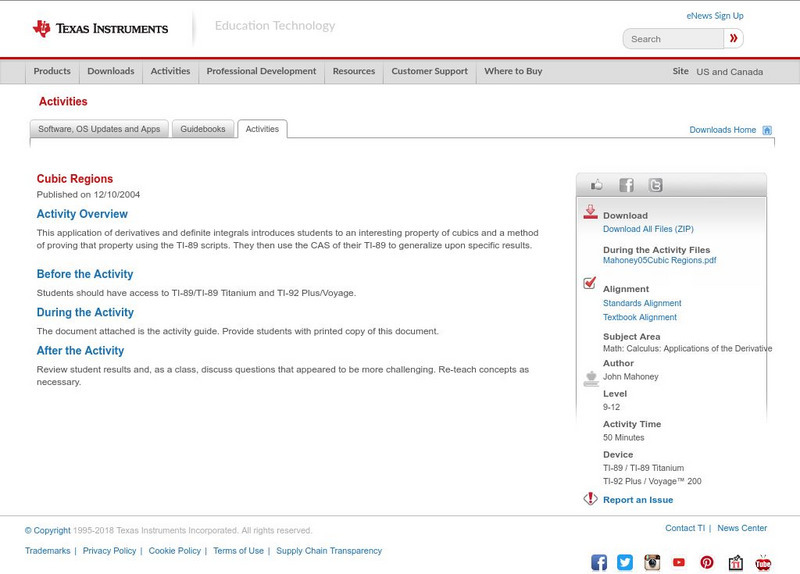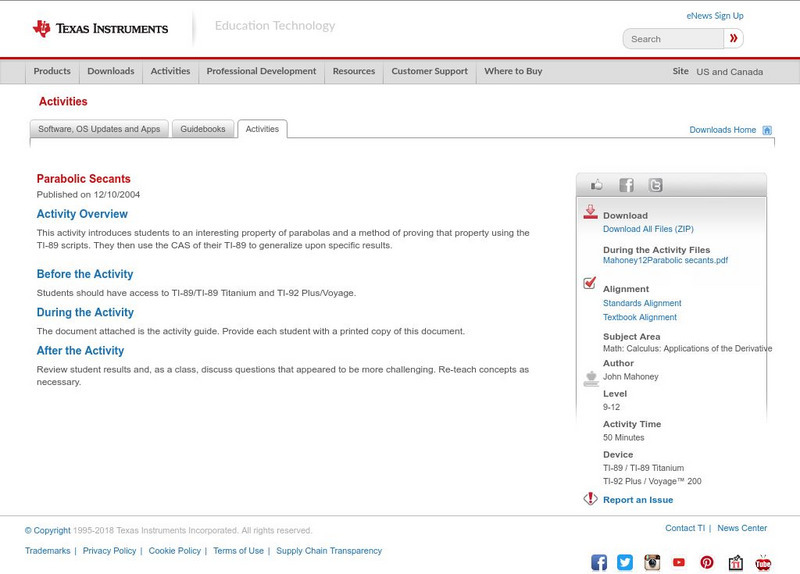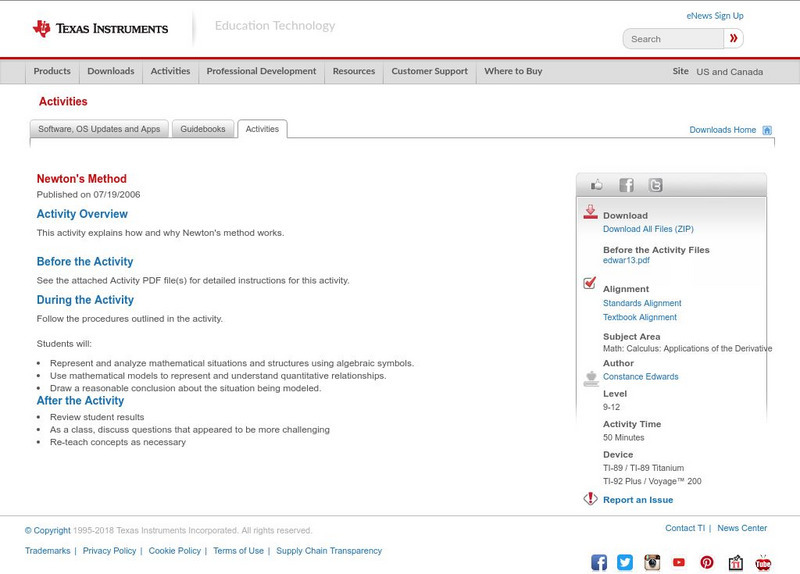Texas Instruments
Texas Instruments: Parametric, Vector, Polar and 3 D Functions
In this activity, students investigate and graph parametric functions, vectors, polar functions, and 3D functions.
Texas Instruments
Texas Instruments: Zeros of a Cubic
This activity involves some of the prerequisites of calculus relating to functions and equations. It also contains an application of differentiation. (Continued. See "before the activity.")
Texas Instruments
Texas Instruments: Least Squares Data Fitting
This activity will allow the student to generate an equation from data points based on minimizing the sum of squares of the vertical distances from each point.
Texas Instruments
Texas Instruments: Managing the National Debt
In this activity, the students will predict the national debt by using logistic growth. The students will find the current national debt and use it to make their predictions.
Texas Instruments
Texas Instruments: Recovering a Function From Its Derivative
In this activity, students use the calculator to visualize a function using the equation describing its derivative and a single point on the function. They start with simple equations and later solve more complex and difficult...
Texas Instruments
Texas Instruments: Hot Tub
This activity is an application of integration. Students first use the calculator to determine specific numeric results to enable them to understand the dynamics of the problem. (Continued. See "before the activity.")
Texas Instruments
Texas Instruments: Quartic Regions
This activity is an application of derivatives and of definite integrals. It introduces students to an interesting property of Quartics which students can verify using the CAS of their TI-89.
Texas Instruments
Texas Instruments: Using Slope Fields
In this activity, students identify whether a slope field approximately reflects a differential equation. They also determine whether a potential solution fits the slope field.
Texas Instruments
Texas Instruments: Approximate Solutions: Differential Equations
The base of the natural logarithm function, is called Euler's number, in honor of Leonhard Euler, a great Swiss mathematician. (Continued. See "before the activity.")
Texas Instruments
Texas Instruments: Graphing Relationships
In this activity, students explore information about a graph based on the first and second derivatives. They learn that a function's derivative is positive when the function increases and negative when the function decreases. They learn...
Texas Instruments
Texas Instruments: Motion of Related Objects
This activity introduces the concept of related rates with parametric equations using a projectile motion problem.
Texas Instruments
Texas Instruments: Discovering the Derivative of the Sine and Cosine Functions
In this activity, students discover the derivative of sin(x) and cos(x) by analyzing a scatter plot of x-values and the function's numerical derivatives at these x-values.
Texas Instruments
Texas Instruments: Hairpin Curves
This activity uses derivatives to determine whether a vehicle of a certain length can traverse sharp curves on a trip up a mountain.
Texas Instruments
Texas Instruments: Recovering a Function From Its Derivative: Numerical Approach
In this activity, students use the calculator to find numerical solution for a function given its derivative and a point on the function.
Texas Instruments
Texas Instruments: Harmonic Motion
In this activity, students learn about the differential equations used to model the simple harmonic motion of a block attached to a spring. They study the effect of air resistance on the motion and create an animation to describe its...
Texas Instruments
Texas Instruments: Cubic Regions
This application of derivatives and definite integrals introduces students to an interesting property of cubics and a method of proving that property using the TI-89 scripts. They then use the CAS of their TI-89 to generalize upon...
Texas Instruments
Texas Instruments: Parabolic Secants
This activity introduces students to an interesting property of parabolas and a method of proving that property using the TI-89 scripts. They then use the CAS of their TI-89 to generalize upon specific results.
Texas Instruments
Texas Instruments: Features of the Ti 89 That Maximize Its Use
This Computer Algebra System (CAS) activity encourages students to investigate the various functions and applications of the CAS calculator. They study and practice various types of problems in algebra and calculus with the help of the...
Texas Instruments
Texas Instruments: Confectionery Delight
Students first make physical models using paper and scissors to get a grasp of the problem and to determine how to set it up. They then use the CAS of the TI-89 and calculus to determine the dimensions of the box which gives the maximum...
Texas Instruments
Texas Instruments: Newton's Method
This activity explains how and why Newton's method works.
Texas Instruments
Texas Instruments: Jet Plane
This activity is an application of differentiation involving related rates. Students set up equations relating the variables and then differentiate them with respect to time to find the rate a distance is changing and an angle is changing.
Texas Instruments
Texas Instruments: Use of Cas in Teaching Differential Calculus by First Princip
This Computer Algebra System (CAS) activity encourages students to investigate the use of CAS to solve functions using derivatives and appropriate formulas.
Texas Instruments
Texas Instruments: Optimization
This activity shows the student how to determine the optimal solution for maximum volume based on the box-with-no-top problem.
Texas Instruments
Texas Instruments: Investigating the Derivatives of Some Common Functions
In this activity, students will investigate the derivatives of sine, cosine, natural log, and natural exponential functions by examining the symmetric difference quotient at many points. They develop the idea of the derivative as a...




